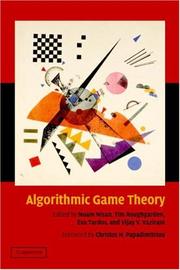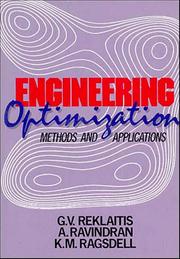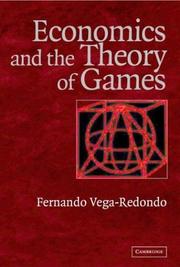| Listing 1 - 10 of 13 | << page >> |
Sort by
|

ISBN: 9780521872829 0521872820 9780511800481 9780511355721 0511355726 9780511352942 0511352948 0511800487 0511354681 9780511354687 1107180872 1139234986 1281153508 9786611153502 0511355203 051135410X 051157374X Year: 2007 Publisher: Cambridge ; New York : Cambridge University Press,
Abstract | Keywords | Export | Availability | Bookmark
 Loading...
Loading...Choose an application
- Reference Manager
- EndNote
- RefWorks (Direct export to RefWorks)
In recent years game theory has had a substantial impact on computer science, especially on Internet- and e-commerce-related issues. Algorithmic Game Theory, first published in 2007, develops the central ideas and results of this exciting area in a clear and succinct manner. More than 40 of the top researchers in this field have written chapters that go from the foundations to the state of the art. Basic chapters on algorithmic methods for equilibria, mechanism design and combinatorial auctions are followed by chapters on important game theory applications such as incentives and pricing, cost sharing, information markets and cryptography and security. This definitive work will set the tone of research for the next few years and beyond. Students, researchers, and practitioners alike need to learn more about these fascinating theoretical developments and their widespread practical application.
Operational research. Game theory --- Game theory --- Algorithms --- Théorie des jeux --- Algorithmes --- 519.83 --- Theory of games --- 519.83 Theory of games --- Théorie des jeux --- Games, Theory of --- Mathematical models --- Mathematics --- Algorism --- Algebra --- Arithmetic --- Foundations --- 681.3*I2 --- 681.3*I2 Artificial intelligence. AI --- Artificial intelligence. AI --- Game theory. --- Algorithms. --- Information Technology --- Computer Science (Hardware & Networks)

ISBN: 0198774729 9786612052545 0191525081 1282052543 0198774737 0191596973 9780191525087 9780198774730 9780198774723 9780191596971 9781282052543 6612052546 Year: 1996 Publisher: Oxford ; New York : Oxford University Press,
Abstract | Keywords | Export | Availability | Bookmark
 Loading...
Loading...Choose an application
- Reference Manager
- EndNote
- RefWorks (Direct export to RefWorks)
This textbook for advanced undergraduate and postgraduate students of Evolutionary Game Theory covers recent developments in the field, with an emphasis on economic contexts and applications. It begind with the basic ideas as they originated within the field of theoretical biology and then proceeds to the formulation of a theoretical framework that is suitable for the study of social and economic phenomena from an evolutionary perspective. Core topics include the EvolutionaryStable Strategy (EES) and Replicator Dynamics (RD), deterministic dynamic models, and stochastic perturbations. A set of short appendices presents some of the technical material referred to in the main text.Evolutionary theory is widely viewed as one of the most promising appraoches to understanding bounded rationality, learning, and change in complex social environments. New avenues of research are suggested by Vega-Redondo, and plentiful examples illustrate the theory's potential applications. The recent boom experienced by this discipline makes the book's systematic presentation of its essential contributions vital reading for any newcomer to the field.
Game theory. --- Evolutionary economics. --- Equilibrium (Economics) --- 519.83 --- Theory of games --- 519.83 Theory of games --- Electronic books. -- local. --- Equilibrium (Economics). --- Game theory --- Evolutionary economics --- Business & Economics --- Economic Theory --- Disequilibrium (Economics) --- Economic equilibrium --- General equilibrium (Economics) --- Partial equilibrium (Economics) --- Games, Theory of --- Mathematical models --- Mathematics --- Economics --- DGE (Economics) --- DSGE (Economics) --- Dynamic stochastic general equilibrium (Economics) --- SDGE (Economic theory) --- Statics and dynamics (Social sciences)

ISBN: 0471055794 Year: 1983 Publisher: New York Wiley
Abstract | Keywords | Export | Availability | Bookmark
 Loading...
Loading...Choose an application
- Reference Manager
- EndNote
- RefWorks (Direct export to RefWorks)
Engineering --- Mathematical optimization --- constrained --- gevalstudie --- gradiëntmethoden --- kuhn-tucker --- lineaire programmering --- Newton-Raphson --- optimalisering --- simplex --- #TWER:MOD --- 519.83 --- Optimization (Mathematics) --- Optimization techniques --- Optimization theory --- Systems optimization --- Mathematical analysis --- Maxima and minima --- Operations research --- Simulation methods --- System analysis --- 519.83 Theory of games --- Theory of games --- Mathematical models --- Operational research. Game theory --- Planning (firm) --- Production management

ISBN: 0691091544 1680158961 9786612157196 1400825113 1282157191 140081460X 9781400814602 9781400825110 9781680158960 9781282157194 Year: 2002 Publisher: Princeton, N.J. ; Oxford : Princeton University Press,
Abstract | Keywords | Export | Availability | Bookmark
 Loading...
Loading...Choose an application
- Reference Manager
- EndNote
- RefWorks (Direct export to RefWorks)
Recognizing that robust decision making is vital in risk management, this book provides concepts and algorithms for computing the best decision in view of the worst-case scenario. The main tool used is minimax, which ensures robust policies with guaranteed optimal performance that will improve further if the worst case is not realized. The applications considered are drawn from finance, but the design and algorithms presented are equally applicable to problems of economic policy, engineering design, and other areas of decision making. Critically, worst-case design addresses not only Armageddon-type uncertainty. Indeed, the determination of the worst case becomes nontrivial when faced with numerous--possibly infinite--and reasonably likely rival scenarios. Optimality does not depend on any single scenario but on all the scenarios under consideration. Worst-case optimal decisions provide guaranteed optimal performance for systems operating within the specified scenario range indicating the uncertainty. The noninferiority of minimax solutions--which also offer the possibility of multiple maxima--ensures this optimality. Worst-case design is not intended to necessarily replace expected value optimization when the underlying uncertainty is stochastic. However, wise decision making requires the justification of policies based on expected value optimization in view of the worst-case scenario. Conversely, the cost of the assured performance provided by robust worst-case decision making needs to be evaluated relative to optimal expected values. Written for postgraduate students and researchers engaged in optimization, engineering design, economics, and finance, this book will also be invaluable to practitioners in risk management.
International financial management --- 519.83 --- 681.3*G16 --- Risk management --- -Algorithms --- 658.155 --- Algorism --- Algebra --- Arithmetic --- Insurance --- Management --- Theory of games --- Optimization: constrained optimization; gradient methods; integer programming; least squares methods; linear programming; nonlinear programming (Numericalanalysis) --- Mathematics --- Foundations --- 681.3*G16 Optimization: constrained optimization; gradient methods; integer programming; least squares methods; linear programming; nonlinear programming (Numericalanalysis) --- 519.83 Theory of games --- Risk --- Decision making --- Algorithms. --- Mathematical models. --- Algorithms --- Mathematical models

ISBN: 9780199207954 019920795X 0191709107 1281145343 9786611145347 1435633504 0191525952 019160724X Year: 2007 Publisher: Oxford: Oxford university press,
Abstract | Keywords | Export | Availability | Bookmark
 Loading...
Loading...Choose an application
- Reference Manager
- EndNote
- RefWorks (Direct export to RefWorks)
Drawing upon and extending his inaugural Lipsey Lectures, Debraj Ray looks at coalition formation from the perspective of game theory. Ray brings together developments in both cooperative and noncooperative game theory to study the analytics of coalition formation and binding agreements.
Coalitions --- Game theory --- Coalition --- Théorie des jeux --- 330.1 --- 519.83 --- Economische grondbegrippen. Algemene begrippen in de economie --- Theory of games --- Coalitions. --- Game theory. --- Coalities --- Samenwerkingsvormen (bedrijfseconomie) --- Speltheorie. --- Coalities. --- Samenwerkingsvormen (bedrijfseconomie). --- 519.83 Theory of games --- 330.1 Economische grondbegrippen. Algemene begrippen in de economie --- Théorie des jeux --- Games, Theory of --- Mathematical models --- Mathematics --- Coalition (Social sciences) --- Social groups --- agreements, bargaining, blocking, cooperative games, coalitions, coalition formation, coalition structure, efficiency, farsightedness, partition functions

ISBN: 9780199218462 0199218463 0191551171 1281149772 1435617657 0191776998 9780191551178 9781435617650 9780191579585 0191579580 9786611149772 6611149775 9781281149770 Year: 2007 Volume: 173 Publisher: New York : Oxford University Press,
Abstract | Keywords | Export | Availability | Bookmark
 Loading...
Loading...Choose an application
- Reference Manager
- EndNote
- RefWorks (Direct export to RefWorks)
Games are played everywhere: from economics to evolutionary biology, and from social interactions to online auctions. This title shows how to play such games in a rational way, and how to maximize their outcomes.
Game theory. --- Théorie des jeux --- Game theory --- 519.8 --- 519.83 --- 681.3*I2 --- Operational research --- Theory of games --- Artificial intelligence. AI --- Business. --- Mathematics. --- Business & Economics --- Mathematics --- Physical Sciences & Mathematics --- Algebra --- Economic Theory --- 681.3*I2 Artificial intelligence. AI --- 519.83 Theory of games --- 519.8 Operational research --- Théorie des jeux --- Games, Theory of --- Mathematical models --- Teoría de los juegos --- Libros electrónicos --- Jocs, Teoria de --- Jocs, Teoria dels --- Teoria de jocs --- Matemàtica --- Models matemàtics

ISBN: 0691096104 9780691096100 0691095272 9780691095271 140088408X 9781400884087 Year: 2016 Publisher: Princeton, NJ : Princeton University Press,
Abstract | Keywords | Export | Availability | Bookmark
 Loading...
Loading...Choose an application
- Reference Manager
- EndNote
- RefWorks (Direct export to RefWorks)
When John Nash won the Nobel prize in economics in 1994, many people were surprised to learn that he was alive and well. Since then, Sylvia Nasar's celebrated biography A Beautiful Mind, the basis of a new major motion picture, has revealed the man. The Essential John Nash reveals his work--in his own words. This book presents, for the first time, the full range of Nash's diverse contributions not only to game theory, for which he received the Nobel, but to pure mathematics--from Riemannian geometry and partial differential equations--in which he commands even greater acclaim among academics. Included are nine of Nash's most influential papers, most of them written over the decade beginning in 1949. From 1959 until his astonishing remission three decades later, the man behind the concepts "Nash equilibrium" and "Nash bargaining"--concepts that today pervade not only economics but nuclear strategy and contract talks in major league sports--had lived in the shadow of a condition diagnosed as paranoid schizophrenia. In the introduction to this book, Nasar recounts how Nash had, by the age of thirty, gone from being a wunderkind at Princeton and a rising mathematical star at MIT to the depths of mental illness. In his preface, Harold Kuhn offers personal insights on his longtime friend and colleague; and in introductions to several of Nash's papers, he provides scholarly context. In an afterword, Nash describes his current work, and he discusses an error in one of his papers. A photo essay chronicles Nash's career from his student days in Princeton to the present. Also included are Nash's Nobel citation and autobiography. The Essential John Nash makes it plain why one of Nash's colleagues termed his style of intellectual inquiry as "like lightning striking." All those inspired by Nash's dazzling ideas will welcome this unprecedented opportunity to trace these ideas back to the exceptional mind they came from.
Game theory --- Riemannian manifolds --- Nash, John Forbes --- Mathematicians --- Mathématiciens --- Nash, John F., --- 510.92 --- Mathématiciens --- Riemannian manifolds. --- Game theory. --- Manifolds, Riemannian --- Riemannian space --- Space, Riemannian --- Geometry, Differential --- Manifolds (Mathematics) --- Games, Theory of --- Theory of games --- Mathematical models --- Mathematics --- 51 <09> --- 519.83 --- 519.83 Theory of games --- Mathematics--Geschiedenis van .. --- Operational research. Game theory --- Théorie des jeux --- Biography --- Biographie --- Mathematics--Geschiedenis van . --- Mathematics--Geschiedenis van
Book
ISBN: 3540692916 3540692908 9783540692904 Year: 2008 Publisher: Berlin, Heidelberg : Springer Berlin Heidelberg : Imprint: Springer,
Abstract | Keywords | Export | Availability | Bookmark
 Loading...
Loading...Choose an application
- Reference Manager
- EndNote
- RefWorks (Direct export to RefWorks)
This book presents the basics of game theory both on an undergraduate level and on a more advanced mathematical level. It covers most topics of interest in game theory, including cooperative game theory. Part I presents introductions to all these topics on a basic yet formally precise level. It includes chapters on repeated games, social choice theory, and selected topics such as bargaining theory, exchange economies, and matching. Part II goes deeper into noncooperative theory and treats the theory of zerosum games, refinements of Nash equilibrium in strategic as well as extensive form games, and evolutionary games. Part III covers basic concepts in the theory of transferable utility games, such as core and balancedness, Shapley value and variations, and nucleolus. Some mathematical tools on duality and convexity are collected in Part IV. Every chapter in the book concludes with a problem section. Hints, answers and solutions are included.
Game theory. --- Algorithms. --- Games, Theory of --- Theory of games --- Mathematical models --- Mathematics --- Algorism --- Algebra --- Arithmetic --- Foundations --- Economic theory. --- Mathematics. --- Operations research. --- Microeconomics. --- Economic Theory/Quantitative Economics/Mathematical Methods. --- Game Theory, Economics, Social and Behav. Sciences. --- Operations Research/Decision Theory. --- Price theory --- Economics --- Operational analysis --- Operational research --- Industrial engineering --- Management science --- Research --- System theory --- Math --- Science --- Economic theory --- Political economy --- Social sciences --- Economic man --- Economics. --- Management science. --- Decision making. --- Deciding --- Decision (Psychology) --- Decision analysis --- Decision processes --- Making decisions --- Management --- Management decisions --- Choice (Psychology) --- Problem solving --- Decision making --- 519.83 --- 681.3*I2 --- 681.3*I2 Artificial intelligence. AI --- Artificial intelligence. AI --- 519.83 Theory of games

ISBN: 0521775906 0521772516 9780521775908 051107770X 1280162783 0511118449 051120597X 0511556950 0511753950 0511076134 9780521772518 9780511753954 1107128757 9780511077708 9780511118449 9781280162787 9780511076138 9786610162789 6610162786 9781107128750 9780511556951 Year: 2003 Publisher: Cambridge, UK ; New York : Cambridge University Press,
Abstract | Keywords | Export | Availability | Bookmark
 Loading...
Loading...Choose an application
- Reference Manager
- EndNote
- RefWorks (Direct export to RefWorks)
This textbook offers a systematic, self-contained account of the main contributions of modern game theory and its applications to economics. Starting with a detailed description of how to model strategic situations, the discussion proceeds by studying basic solution concepts, their main refinements, games played under incomplete information, and repeated games. For each of these theoretical developments, there is a companion set of applications that cover the most representative instances of game-theoretic analysis in economics, e.g. oligopolistic competition, public goods, coordination failures, bargaining, insurance markets, implementation theory, signaling and auctions. The theory and applications covered in the first part of the book fall under the so-called 'classical' approach to game theory, which is founded on the paradigm of players' unlimited rationality. The second part shifts towards topics that no longer abide by that paradigm. This leads to the study of topics such as the interplay between evolution and rationality.
economic concepts --- speltheorie --- Operational research. Game theory --- statistics-related concepts --- Quantitative methods (economics) --- Game theory --- Equilibrium (Economics) --- Economics --- Economics. --- Business & Economics --- Economic Theory --- 519.83 --- AA / International- internationaal --- 305.6 --- speltheorieën --- 330.015193 --- Economic theory --- Political economy --- Social sciences --- Economic man --- Disequilibrium (Economics) --- Economic equilibrium --- General equilibrium (Economics) --- Partial equilibrium (Economics) --- Stagnation (Economics) --- Statics and dynamics (Social sciences) --- Games, Theory of --- Theory of games --- Mathematical models --- Mathematics --- Risicotheorie, speltheorie. Risicokapitaal. Beslissingsmodellen. --- Game theory. --- Equilibrium (Economics). --- 519.83 Theory of games --- DGE (Economics) --- DSGE (Economics) --- Dynamic stochastic general equilibrium (Economics) --- SDGE (Economic theory) --- Risicotheorie, speltheorie. Risicokapitaal. Beslissingsmodellen --- Business, Economy and Management
Book
ISBN: 9781107096424 1107096421 9780511973031 9781139206600 1139206605 0511973039 9781139205023 1139205021 1316090442 9781316090442 1280484640 9781280484643 9786613579621 6613579629 1139205811 9781139205818 1139203622 9781139203623 1139202219 9781139202213 Year: 2012 Publisher: Cambridge [England] : Cambridge University Press,
Abstract | Keywords | Export | Availability | Bookmark
 Loading...
Loading...Choose an application
- Reference Manager
- EndNote
- RefWorks (Direct export to RefWorks)
"Global threats of terrorism, drug-smuggling and other crimes have led to a significant increase in research on game theory for security. Game theory provides a sound mathematical approach to deploy limited security resources to maximize their effectiveness. A typical approach is to randomize security schedules to avoid predictability, with the randomization using artificial intelligence techniques to take into account the importance of different targets and potential adversary reactions. This book distills the forefront of this research to provide the first and only study of long-term deployed applications of game theory for security for key organizations such as the Los Angeles International Airport police and the US Federal Air Marshals Service. The author and his research group draw from their extensive experience working with security officials to intelligently allocate limited security resources to protect targets, outlining the applications of these algorithms in research and the real world"--
Computer security --- Game theory --- Security, Internatonal --- Mathematical models --- Computer security. --- Game theory. --- Security, International --- 519.83 --- 681.3*I2 --- Collective security --- International security --- International relations --- Disarmament --- International organization --- Peace --- Games, Theory of --- Theory of games --- Mathematics --- Computer privacy --- Computer system security --- Computer systems --- Computers --- Electronic digital computers --- Security of computer systems --- Data protection --- Security systems --- Hacking --- Mathematical models. --- Artificial intelligence AI --- Security measures --- 681.3*I2 Artificial intelligence. AI --- Artificial intelligence. AI --- 519.83 Theory of games --- Cyber security --- Cybersecurity --- Protection of computer systems --- Protection --- Security, International - Mathematical models
| Listing 1 - 10 of 13 | << page >> |
Sort by
|

 Search
Search Feedback
Feedback About UniCat
About UniCat  Help
Help News
News